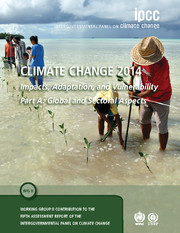 Climate Change 2014 – Impacts, Adaptation and Vulnerability: Part A: Global and Sectoral Aspects
Climate Change 2014 – Impacts, Adaptation and Vulnerability: Part A: Global and Sectoral Aspects Book contents
- Frontmatter
- Contents
- Foreword, Preface, and Dedication
- Summary for Policymakers
- Technical Summary
- Cross-Chapter Boxes
- Chapters 1-20
- Chapter 1 Point of Departure
- Chapter 2 Foundations for Decision Making
- Chapter 3 Freshwater Resources
- Chapter 4 Terrestrial and Inland Water Systems
- Chapter 5 Coastal Systems and Low-Lying Areas
- Chapter 6 Ocean Systems
- Chapter 7 Food Security and Food Production Systems
- Chapter 8 Urban Areas
- Chapter 9 Rural Areas
- Chapter 10 Key Economic Sectors and Services
- Chapter 11 Human Health: Impacts, Adaptation, and Co-Benefits
- Chapter 12 Human Security
- Chapter 13 Livelihoods and Poverty
- Chapter 14 Adaptation Needs and Options
- Chapter 15 Adaptation Planning and Implementation
- Chapter 16 Adaptation Opportunities, Constraints, and Limits
- Chapter 17 Economics of Adaptation
- Chapter 18 Detection and Attribution of Observed Impacts
- Chapter 19 Emergent Risks and Key Vulnerabilities
Chapter 15 - Adaptation Planning and Implementation
Published online by Cambridge University Press: 05 January 2015
- Frontmatter
- Contents
- Foreword, Preface, and Dedication
- Summary for Policymakers
- Technical Summary
- Cross-Chapter Boxes
- Chapters 1-20
- Chapter 1 Point of Departure
- Chapter 2 Foundations for Decision Making
- Chapter 3 Freshwater Resources
- Chapter 4 Terrestrial and Inland Water Systems
- Chapter 5 Coastal Systems and Low-Lying Areas
- Chapter 6 Ocean Systems
- Chapter 7 Food Security and Food Production Systems
- Chapter 8 Urban Areas
- Chapter 9 Rural Areas
- Chapter 10 Key Economic Sectors and Services
- Chapter 11 Human Health: Impacts, Adaptation, and Co-Benefits
- Chapter 12 Human Security
- Chapter 13 Livelihoods and Poverty
- Chapter 14 Adaptation Needs and Options
- Chapter 15 Adaptation Planning and Implementation
- Chapter 16 Adaptation Opportunities, Constraints, and Limits
- Chapter 17 Economics of Adaptation
- Chapter 18 Detection and Attribution of Observed Impacts
- Chapter 19 Emergent Risks and Key Vulnerabilities
Summary
15.1. Introduction
As impacts of climate change have become apparent around the world, adaptation has attracted increasing attention. The impacts are expected to be particularly severe in the developing world and among marginalized communities because of limited adaptive capacity. Adaptation is an important pillar for the response to climate change, and the IPCC Assessment Reports highlight the complementary roles of mitigation and adaptation in climate policy. Particularly, IPCC Fourth Assessment Report (AR4) (IPCC, 2007) provided an evaluation of adaptation that is the departure point for the present report. The AR4 emphasized that adaptation will be necessary to address impacts resulting from climate change that is already unavoidable due to past emissions. A wide array of adaptation options were noted, but also that the level of adaptation was inadequate for a reduction in vulnerability to future climate change. Moreover, the report showed there are barriers, limits, and costs that are not fully understood.
Since the publication of IPCC AR4, significant progress has been made on the adaptation activities both quantitatively and qualitatively. In particular, there is substantial progress in development of national adaptation strategies and plans. These include climate change adaptation (CCA) legislation and formal national strategies. As of 2012, 26 of the Organisation for Economic Co-operation and Development (OECD) countries have developed or are currently developing strategic frameworks for national adaptation (Mullan et al., 2013). Forty-nine least developed countries produced and submitted National Adaptation Programmes of Action (NAPAs) to the United Nations Framework Convention on Climate Change (UNFCCC) as of 2013. At the same time, the academic literature and reports from multilateral development agencies, international organizations, and non-governmental organizations (NGOs) document numerous cases of community-based activities for CCA in developing countries. Through these activities, a range of lessons are being learned, while barriers and limits are also emerging. The wider social dimensions of adaptation have also attracted more attention since AR4. As the diverse, complex, and context-specific nature of adaptation becomes apparent (differences in resources, values, needs, and perceptions among and within societies), the related areas expand in the wider social-ecological system, and the number of stakeholders increases. Based on this recognition, the importance of mainstreaming adaptation and the integration of adaptation policies within those of development increases.
- Type
- Chapter
- Information
- Climate Change 2014 – Impacts, Adaptation and Vulnerability: Part A: Global and Sectoral AspectsWorking Group II Contribution to the IPCC Fifth Assessment Report, pp. 869 - 898Publisher: Cambridge University PressPrint publication year: 2014
- 9
- Cited by


